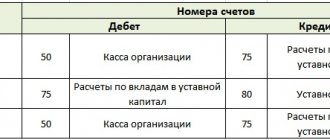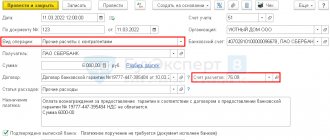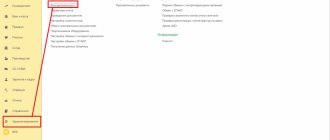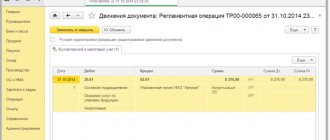Organization of accounting
It is necessary to organize accounting in a small enterprise according to general rules. That is, the organization of accounting is entrusted to the head of the small business entity. In this case, the manager is obliged to entrust accounting to the chief accountant or other official. In addition, the manager has the right to enter into an agreement for the provision of accounting services with a third-party organization or may take over the accounting itself. This is stated in Part 3 of Article 7 of the Law of December 6, 2011 No. 402-FZ, paragraph 3 of the Recommendations approved by the decision of the Presidential Council of the NP “Institute of Professional Accountants and Auditors of Russia” dated April 25, 2013 No. 4/13.
Features of accounting and tax accounting in small enterprises
Key words: accounting, tax accounting, small businesses, simplified taxation system.
Currently, small businesses (SSEs) play an important role in the market economy. The development of this segment contributes to the emergence of independent sources of income for a significant part of the economically active population, helps to revive the commodity markets and create new jobs and, as a result, reduce the social burden on expenditures of budgets of different levels.
All this led to the need to study the peculiarities of functioning, as well as the organization and maintenance of accounting and tax accounting in small businesses, since accounting generates information about the work of small businesses, records all changes occurring in production, supply and sales activities, i.e. e. provides the necessary information about the circulation of funds of a small enterprise. Thus, accounting in small businesses is an integral part of the production management system.
First, let's define accounting and tax accounting.
Accounting is an orderly system of collecting, recording and summarizing information in monetary terms about the assets, liabilities, income and expenses of an organization and their changes. This system is formed by a continuous, continuous, documentary display of all business transactions.
Tax accounting is a system for summarizing information to determine the tax base for a tax based on data from primary documents, grouped in accordance with the procedure provided for by tax legislation.
According to the Law “On Accounting” dated December 6, 2011 No. 402-FZ, small businesses have the right to use simplified accounting (BU):
− maintaining financial accounting is the responsibility of any organization (with the exception of certain cases specified in the law);
− simplified accounting is a right granted to small businesses.
Simplified accounting is an opportunity to systematize information about accounting objects without using individual generally accepted accounting elements.
This means that the SMP can forget about the accrual method and determine income and expenses on a cash basis. In addition, SMP can use a simplified system of accounting registers, has the right to refuse to maintain accounts 09 and 77, intended for accounting for deferred tax assets and liabilities (do not keep records of permanent and temporary differences), can use one synthetic account instead of a group of accounts (for example, account 20 “Main production” instead of accounts 23, 25 and 26); it is possible not to form reserves, not to apply separate PBUs (for example, for construction SMP - PBU 2/2008 “Accounting for construction contracts”, approved by Order of the Ministry of Finance of Russia dated October 24, 2008 No. 116n), not to revaluate fixed assets and intangible assets, not to reflect impairment Intangible assets and financial investments in accounting. And also recognize commercial and administrative expenses in the cost of products (goods, works, services) in full in the reporting year of their recognition as expenses for ordinary activities.
Next, we will consider which taxation systems an SMP can choose.
For 2022, there are 5 taxation regimes for organizations and individual entrepreneurs in Russia: 1 general (OSN) and 4 special (USN, UTII, Unified Agricultural Tax, PSN).
Organizations have the right to choose which tax regime to apply.
However, it is more profitable for SPMs to use special tax regimes, since they can significantly simplify the system of paying taxes, submitting reports and save on payments.
One of the most common regimes is the simplified taxation system.
The simplified taxation system (STS) is a special tax regime in Russia aimed at reducing the tax burden on small businesses, as well as facilitating and simplifying tax accounting and accounting.
Depending on the specifics of doing business, the tax rate can be 6% of revenue or 15% of the difference between income and expenses.
Legal entities using the simplified tax system pay one single tax instead of several. Because of this, there is no need to pay income tax, corporate property tax, unified social tax, VAT, etc. As a result of such savings, switching to the simplified tax system has become beneficial for many organizations, since thanks to it more of their own funds remain in the account. An entrepreneur using the simplified tax system receives the right not to keep accounting records, with the exception of accounting for fixed assets and intangible assets. For organizations, since 2013, accounting is mandatory. In this case, the organization submits only one single tax return.
Literature:
- Federal Law “On Accounting” dated December 6, 2011 N 402-FZ
- Tax Code of the Russian Federation (TC RF)
- Borodin, V. A. The theory of accounting / V. A. Borodin, Yu. A. Babaev, N. D. Amaglobeli; ed. Yu. A. Babaev. — 4th ed., revised. and additional - Moscow: Unity-Dana, 2015. - 303 p.
- Mayburov I. A., Yadrennikova E. V., Mishina E. B.; ed. I. A. Mayburov. — 6th ed., revised. and additional - Moscow: Unity-Dana, 2015. - 487 p. Taxes and taxation: textbook
- Chernov V. A. Accounting (financial) reporting / V. A. Chernov; ed. M. I. Bakanov. - Moscow: Unity-Dana, 2015. - 128 p.
Full form of accounting
With this form of accounting, use special statements to record facts of economic life. Approve the list of such statements in the accounting policy. For example, a small business might use:
- statement of accounting of fixed assets and depreciation - form No. 1MP;
- inventory accounting sheet - form No. 2MP;
- production cost accounting sheet - form No. 3MP;
- cash accounting statement - form No. 4MP;
- statement of accounting of settlements and other operations - form No. 5MP;
- sales accounting statement - form No. 6MP;
- statement of accounting of settlements with suppliers - form No. 7MP;
- statement of accounting of settlements with personnel for wages - form No. 8MP;
- summary sheet (chess) - form No. 9MP.
The procedure for filling out the statements is given in paragraphs 30–39 of the Recommendations, approved by the decision of the Presidential Council of the NP “Institute of Professional Accountants and Auditors of Russia” dated April 25, 2013 No. 4/13.
Record transactions on the relevant accounts in the statements. In this case, each operation is recorded in two statements: in one - according to the debit of the account, indicating the number of the account being credited (in the column “Corresponding account”), in the other - according to the credit of the corresponding account and a similar entry in the number of the debited account. In both statements, make notes about the content of the fact of economic life.
In addition, the statements must indicate the reporting period for which they are being filled out. At the end of the reporting period, calculate the totals, and the responsible employee who filled out the statement must sign it.
To correct errors in statements, cross out the incorrect text or amount and write the correct figures above the crossed out text. The correction of the error must be certified with the inscription “Corrected”, indicating the date of correction and the signature of the responsible employee.
This is stated in paragraphs 24–29 of the Recommendations, approved by the decision of the Presidential Council of the NP “Institute of Professional Accountants and Auditors of Russia” dated April 25, 2013 No. 4/13.
An example of how to reflect the facts of economic activity when using a full form of accounting
Alpha LLC is engaged in tailoring.
The organization has three employees:
- director – Lvov A.V. with a salary of 10,000 rubles;
- accountant – Zaitseva V.N. with a salary of 8000 rubles.
- seamstress – Ivanova E.N. with a salary of 5000 rubles.
At the beginning of January 2016, Alpha had the following balances:
- for account 50 “Cash desk” – 30,000 rubles;
- for account 51 “Current account” – 50,000 rubles;
- balance of work in progress - 5000 rubles.
- balance of materials – 5000 rub.
In January, the following transactions were carried out, for which the corresponding statements were filled out:
| date | Contents of operation | Sum | Wiring | Reflection in the statement |
| 12.01.2016 | An invoice has been submitted for payment for work performed | 5000 | Debit 20 Credit 60 | Production cost accounting sheet (form No. 3MP) Statement of settlements with suppliers (form No. 7MP) |
| 12.01.2016 | An invoice has been submitted for payment for purchased materials. | 25 000 | Debit 10 Credit 60 | Inventory accounting sheet (form No. 2MP) Statement of settlements with suppliers (form No. 7MP) |
| 12.01.2016 | Invoice paid for work performed | 5000 | Debit 60 Credit 51 | Statement of settlements with suppliers (form No. 7MP) Cash accounting statement (form No. 4MP) |
| 14.01.2016 | Salary accrued | 23 000 | Debit 20 Credit 70 | Production cost accounting sheet (form No. 3MP) Statement of accounting of settlements with personnel for wages (form No. 8MP) |
| 14.01.2016 | Contributions accrued | 5980 | Debit 20 Credit 69 | Production cost accounting sheet (form No. 3MP) Statement of accounting of settlements with personnel for wages (form No. 8MP) |
| 15.01.2016 | Salaries paid from the cash register | 22 987 | Debit 70 Credit 50 | Statement of accounting of settlements with personnel for wages (form No. 8MP) Cash accounting statement (form No. 4MP) |
| 15.01.2016 | Personal income tax withheld | 2990 | Debit 70 Credit 68 | Statement of accounting of settlements with personnel for wages (form No. 8MP) Statement of accounting of settlements and other transactions (form No. 5MP) |
| 15.01.2016 | Transferred to the personal income tax budget | 2990 | Debit 68 Credit 51 | Statement of accounting of settlements and other transactions (form No. 5MP) Cash accounting statement (form No. 4MP) |
| 15.01.2016 | Insurance premiums transferred to the budget | 5980 | Debit 69 Credit 51 | Statement of accounting of settlements and other transactions (form No. 5MP) Cash accounting statement (form No. 4MP) |
| 15.01.2016 | Materials written off for production | 30 000 | Debit 20 Credit 10 | Production cost accounting sheet (form No. 3MP) Inventory accounting sheet (form No. 2MP) |
| 20.01.2016 | Paid for materials | 25 000 | Debit 60 Credit 51 | Statement of settlements with suppliers (form No. 7MP) Cash accounting statement (form No. 4MP) |
| 26.01.2016 | Products shipped | 80 000 | Debit 62 Credit 90 | Sales record sheet (form No. 6MP) |
| 29.01.2016 | Payment received from buyer | 80 000 | Debit 51 Credit 62 | Sales record sheet (form No. 6MP) Cash accounting statement (form No. 4MP) |
Russian Economic UNIVERSITY Timeni G.V. Plekhanov
The goal of the program is to provide students with new competencies and skills in the field of accounting and taxation of small businesses when applying different tax regimes.
Achieving this goal is achieved by solving the following tasks:
- Studying the basics of legal regulation of accounting and taxation of small businesses in the Russian Federation;
- Study of the conceptual foundations of accounting, principles and methods of accounting in small business organizations, industry affiliation and functional purpose;
- In-depth study of forms and methods of tax accounting for small businesses;
- Determination of tax obligations of small businesses when applying various tax regimes;
- Mastering the skills of preparing tax reporting;
- Studying the features of payment of insurance premiums by small businesses.
YOU WILL:
Know:
- the concept of “small businesses”;
- criteria for classification as small organizations;
- stages of the accounting process;
- principles of organizing the tax service and accounting in a small enterprise;
- taxation procedure for small businesses;
- the procedure and conditions for the transition to special tax regimes;
- the procedure for preparing tax reporting for a small business.
Be able to:
- apply relevant regulations governing the activities of small organizations;
- apply regulatory legislation in professional activities, making an informed choice between various methods and methods of accounting;
- draw up an accounting policy for tax purposes for a small organization, organize tax accounting for a small business enterprise;
- calculate tax liabilities when applying special tax regimes, prepare tax reports;
- determine the basis for calculating insurance premiums.
Own:
- methods of collecting and processing accounting information, organizing rational document flow;
- accounting methods in a small enterprise;
- skills in determining the specifics of taxation of small businesses and applying all possible benefits and exemptions within the framework of the general taxation regime;
- skills in determining the features of calculating tax liabilities when applying various special tax regimes;
- optimization of tax obligations using a special tax regime, methods of reporting and its interpretation;
- features of calculating insurance premiums for small businesses.
Advantages:
- Practical orientation, focus on your results;
- The best practicing teachers of major departments;
- Flexible training schedule.
Form of study: full-time, part-time, (evening), weekend courses.
Tuition fee: For REU students - 7,000 rubles, for external students - 12,000 rubles.
Duration of training: 2 months.
Number of hours: 72.
Start date of training: As the group is formed (15 people).
Contact person: Afanasiadi Kozmas Georgievich.
Telephone:, +7 (985) 640-11-26.
Email:
Acceptance of documents: Year-round.
Plan
- Module 1. Organizational and legal framework for the activities of small businesses;
- Module 2. The procedure for taxation of small businesses when applying the general taxation regime;
- Module 3. The procedure for taxation of small businesses when applying special tax regimes;
- Module 4. The procedure for payment of insurance premiums by individual entrepreneurs and small business organizations;
- Module 5. Formation of accounting policies for small business organizations;
- Module 6. Organization of a simplified accounting system, accounting (financial) reporting and tax accounting in a small enterprise.
Document type: Advanced training.
Document name: Certificate.
Requirements: Students who have received higher education (bachelor, master, specialist) in specialized and non-core higher educational institutions are accepted.
Entrance tests: None.
Registration for the program








